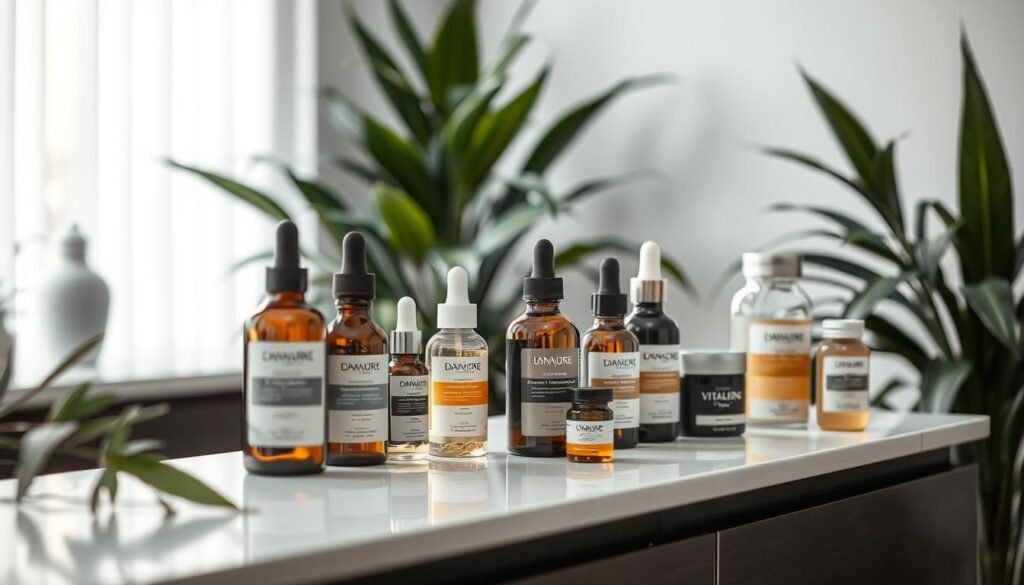Did you know an adult scalp has around 100,000 hair follicles? These follicles alternate between resting and growing. Stress can significantly harm your hair’s health. High levels of cortisol from stress may stop hair follicles from working right. This can cause stress-induced alopecia, leading to sudden hair loss in many people.
It’s vital to tackle hair loss linked to stress because there are treatments that work. This piece will explore effective solutions for stress-related hair loss. We’ll look at medical and natural remedies, lifestyle tweaks, and how managing stress can lead to healthier hair.
Key Takeaways
- Chronic stress can trigger hair loss by affecting cortisol levels.
- Stress-induced hair shedding can manifest as Telogen Effluvium or other conditions.
- Effective treatments include both pharmaceutical options and natural remedies.
- Lifestyle modifications, such as better sleep and diet, are essential for hair regrowth.
- Stress management techniques can improve overall well-being and hair health.
Understanding Stress-Induced Hair Loss
Stress-Induced Hair Loss can greatly impact someone, leading to thinning or shedding of hair. This is often linked to Telogen Effluvium, where hair follicles enter a resting phase too early. This can cause a noticeable increase in hair loss for both men and women.
Several stressors can lead to this condition. Emotional stress such as trauma, loss, and big life changes can trigger it. Work or personal life pressures also play a part. The body reacts by releasing certain hormones, harming the hair follicles.
In extreme cases, this issue can trigger an autoimmune response, leading to alopecia areata. This affects around 6 million people in the U.S. alone. Understanding how this type of hair loss works can help find effective treatments.
Research shows stress affects hair health. Studies, like one you can read here, are uncovering new treatment paths. These involve certain molecular pathways that could help treat stress-related hair loss.
Knowing the impact of stress on hair is crucial. It helps us deal with the emotional and physical aspects of hair loss. Knowing how stress affects our body is the first step towards managing our health better.
| Condition | Description | Triggers |
|---|---|---|
| Telogen Effluvium | Temporary hair loss due to stress or illness. | Ongoing stress, significant events, illness, medication. |
| Alopecia Areata | Autoimmune disorder causing patchy hair loss. | Severe emotional stress, autoimmune triggers. |
| Trichotillomania | Compulsive hair-pulling disorder linked to anxiety. | Stress, emotional triggers, anxiety. |
By focusing on these aspects, people can understand their situations better and look for the right treatments.
Common Causes of Stress-Related Alopecia
Stress-related alopecia includes different kinds of hair loss caused by stress. Understanding these common causes of hair loss is key for those looking for help. One main type is telogen effluvium. This causes people to lose up to 300 hairs a day. Usually, people only lose about 100 hairs daily. This condition often lasts six to nine months before hair grows back normally.
Alopecia areata also greatly affects people, with over six million cases in the United States. It leads to patchy hair loss. These bald patches are often as big as a quarter. Knowing what stress causes this can help manage it.
Trichotillomania shows another side of stress-related hair loss. It’s an urge to pull out one’s hair. This starts in the preteen years and stress can make it worse. Psychological therapy, like cognitive behavioral therapy, is a key treatment.
| Condition | Symptoms | Statistics | Treatment Options |
|---|---|---|---|
| Telogen Effluvium | Increased shedding of hair | Averages 300 hairs lost daily | Minoxidil, stress management |
| Alopecia Areata | Patchy hair loss | Affects over 6 million in the U.S. | Steroid creams, immunotherapy |
| Trichotillomania | Compulsive hair pulling | Affects 1-2% of the population | Cognitive behavioral therapy |
Stress is a big factor in different types of hair loss. It includes telogen effluvium, alopecia areata, and trichotillomania. Knowing what stresses cause this can help find good treatments for hair loss.
Physical and Emotional Effects of Stress on Hair
Stress has a big impact on our emotions and our body, especially on hair health. One key effect of stress is telogen effluvium, where stress pushes most hair to stop growing. This results in lots of hair loss over time.
People with acute telogen effluvium start to see their hair thin out 2 to 3 months after stress hits. Usually, this gets better for about 95% of folks within six months. But, seeing hair get thin can make a person feel more anxious and depressed. This worsens the cycle of stress harming hair health.
Chronic telogen effluvium goes on for more than six months and can thin out hair all over. Normally, people lose 50 to 100 hairs a day. But with a lot of stress, some might lose up to 300 hairs daily. If it gets really bad, hair loss can even reach eyebrows and body hair.
The Physical Effects on Hair can vary from all-over thinning to bare spots. These changes can upset someone a lot, and make the cycle of stress and hair loss worse. Losing a lot of hair can really impact someone’s mental health, showing how closely our minds and hair are linked.

| Type of Telogen Effluvium | Duration | Hair Loss Potential | Emotional Impact |
|---|---|---|---|
| Acute Telogen Effluvium | Less than 6 months | Up to 300 strands/day | Anxiety and temporary distress |
| Chronic Telogen Effluvium | More than 6 months | Widespread thinning | Prolonged emotional stress |
Treatments for Hair Loss from Stress
Stress can really hurt your hair, sometimes leading to hair loss. Looking for effective treatments is crucial. There are many options available, from medications to hair restoration procedures. Let’s explore some of the most effective methods.
Medications for Hair Regrowth
Medications are key in fighting hair loss from stress. Minoxidil (also known as Rogaine) and finasteride (Propecia) are top choices. They help wake up sleeping hair follicles and grow new hair. Adding minoxidil to your daily routine can help especially if you’re genetically prone to thinning hair. Also, vitamins like B6, B12, and C can keep your scalp and hair healthy.
Topical Treatments and Their Efficacy
Topical treatments can make your hair thicker and help it grow back. Products like Grow Perfect™ Hair Growth Serum and MDhair Restore Serum have special ingredients for healthier hair follicles. Using these with a nourishing shampoo can make your hair look and feel better. They work best when used correctly and support scalp health.
Hair Restoration Procedures
For serious hair loss, there are innovative treatments available. Platelet-rich plasma (PRP) therapy uses your body’s growth factors to wake up hair follicles. Hair transplant surgery is also a popular, lasting solution. Both methods aim to bring back hair density and tackle stress-related hair loss causes.

| Treatment Type | Effectiveness | Duration for Results |
|---|---|---|
| Minoxidil | High | 3-6 months |
| Finasteride | High | 6-12 months |
| PRP Therapy | Moderate to High | 3-6 months |
| Topical Treatments | Moderate | 2-4 months |
| Hair Transplant | High | 6-12 months |
These treatments are a comprehensive way to deal with hair loss from stress. It’s important to talk with a healthcare pro to customize your treatment plan.
Natural Haircare Solutions for Stress-Related Hair Loss
Stress plays a big part in hair loss. So, looking into Natural Haircare Solutions is key. Using herbal remedies can really help grow healthier hair and make your scalp healthier, too. We’re going to talk about these remedies and how essential oils can be good for your hair.
Herbal Remedies That Promote Growth
Many Herbal Remedies for Hair Loss help make your hair healthier. Some top picks include:
- Saw Palmetto: It can block DHT, a hormone that often causes hair loss.
- Red Ginseng: This might help your hair grow better by moving it from resting to growing phase.
- Onion Juice: It’s full of sulfur and can moisturize your scalp and make your hair stronger.
Adding these herbs to your care routine offers a natural way to fight hair loss with no bad side effects.
Essential Oils and Nourishing Treatments
Essential oils can really help your hair health. Some important ones include:
- Rosemary Oil: Research says it could work as well as minoxidil to help hair grow.
- Peppermint Oil: It boosts blood flow to the scalp, encouraging hair to grow healthily.
Eating foods rich in omega-3s and vitamins can also help your scalp and hair be healthier. Managing stress well, along with these natural treatments, can lead to stronger and thicker hair.

| Herb/Oil | Benefits |
|---|---|
| Saw Palmetto | Blocks DHT, reducing hair loss |
| Red Ginseng | Improves transition to hair growth phase |
| Onion Juice | Strengthens hair and hydrates scalp |
| Rosemary Oil | Stimulates hair growth, comparable to minoxidil |
| Peppermint Oil | Increases blood flow to the scalp |
Stress Management Techniques to Enhance Hair Health
Using stress management methods is crucial for better hair growth. Stress can cause a condition called telogen effluvium, which makes hair fall out sooner. Trying out mindfulness can help a lot with both your mood and your hair.
Meditation and Mindfulness Practices
Meditation is a strong way to deal with stress. It helps lower the stress hormone cortisol, which is bad for hair. Doing it often makes people feel calmer and more stable, emotionally. This calmness is perfect for helping your hair grow back better.
Yoga and Physical Activity for Better Well-Being
Yoga does more than just soothe your mind. It gets blood moving better, which is good for your whole body. Certain yoga moves get more blood to your scalp, helping hair grow. Being active not just fights stress but also keeps you healthy, helping your hair stay nice.
Effective Deep Breathing Exercises
Deep breathing is a simple way to fight stress. It makes your mind clearer and less anxious. By controlling your breath, you can relax. This relaxation is also good for your hair. Adding these breathing exercises to your day can really help manage stress better.
Besides those techniques, looking up tips to recover hair loss from might help too. Focusing on your overall well-being is key to growing healthy hair and stopping stress-related hair loss.
| Technique | Benefits |
|---|---|
| Meditation | Reduces cortisol levels, enhances emotional well-being |
| Yoga | Improves circulation, fosters relaxation |
| Deep Breathing | Clears the mind, alleviates anxiety |
Adopting Lifestyle Changes for Healthy Hair
Making lifestyle changes can greatly help your hair. Focus on getting good sleep and staying hydrated. These steps not only make you feel better but also help your hair grow. They help the body bounce back from stress.
The Importance of Sleep Hygiene
Good sleep is key for healthy hair. It lets the body fix cells and balance hormones. This balance helps your hair grow properly. If you don’t sleep well, it can cause more hair to fall out. Try to get 7-9 hours of sleep each night to keep your hair strong.
Hydration and Its Role in Hair Health
Drinking enough water is crucial for your hair. It helps blood flow to your scalp. This ensures hair follicles get enough nutrients and oxygen. Nutrients like biotin, iron, and vitamin E are important for strong hair. Making changes to drink more water and eat well can quickly improve hair health. Also, avoid smoking and drinking too much alcohol to keep your hair in good shape.
| Aspect | Benefits |
|---|---|
| Sleep Hygiene | Supports hormonal balance and cell repair |
| Hydration | Enhances blood circulation to the scalp |
| Nutrient Intake | Promotes resilience and growth of hair |
| Healthy Habits | Prevents damage and supports overall hair health |
These lifestyle changes are key for long-lasting healthy hair. For more tips and info on hair and health, check out this link.
Nutrient-Rich Diet for Hair Growth
Eating well is key to beautiful hair and preventing hair loss. By eating the right vitamins and minerals, your hair can grow strong and healthy. Eating a range of healthy foods is the best way to fight hair loss.
Key Vitamins and Minerals for Healthy Hair
Healthy hair needs lots of vitamins and minerals. Here are some important ones:
- Biotin (Vitamin B7): This helps make keratin. You can find it in eggs and almonds.
- Vitamin A: It keeps your scalp moist. You’ll find it in sweet potatoes and greens.
- Vitamin C: This helps your body use iron and make collagen. It’s in citrus fruits and bell peppers.
- Iron: It’s important for your hair to grow. Eat spinach, lentils, and red meat to get some.
- Zinc: Needed for hair to grow and repair. You can find it in oysters, beef, and pumpkin seeds.
- Omega-3 fatty acids: These keep your scalp healthy. They’re in salmon, walnuts, and flaxseeds.
Food Choices That Boost Hair Health
Choosing the right foods can make your hair healthier. Here are some good choices:
- Leafy greens: They’re full of vitamins for strong hair.
- Nuts and seeds: They have fats and vitamin E for hair health.
- Fatty fish: This fish has omega-3s for a moisturized scalp.
- Beans and legumes: They offer protein and vitamins for hair growth.
- Fruits like berries: Berries are full of antioxidants to protect hair.
- Sweet potatoes: A great source of beta-carotene, turning into vitamin A.
A balanced Nutrient-Rich Diet enhances your vitamin supply for healthy hair. To learn more, check out foods that boost hair growth.
Herbal Supplements for Hair Regrowth
Herbal supplements for hair growth are getting popular as people look for natural ways to stop hair loss. This is especially true for stress-related hair loss issues. Biotin is praised for boosting keratin, which is vital for hair. Saw palmetto might block certain enzymes, helping prevent hair thinning.
Other herbs like horsetail add silica, which thickens hair. Red clover can fight inflammation, aiding in hair growth as well.
Popular Supplements and Their Benefits
Stinging nettle, rich in beta-sitosterol, could help hair grow by making hair follicles more active. Yet, the effectiveness of herbal supplements can differ among individuals. Limited research on humans means we should be careful about possible side effects or drug interactions.
Consulting with Healthcare Professionals
Talking to healthcare experts before trying new supplements is essential. They offer advice tailored to your health needs. They’ll check if other health issues are causing hair loss and suggest safe doses.
Hair loss can come from many sources, like diet or hormones. Professional help is key for good hair health and well-being.